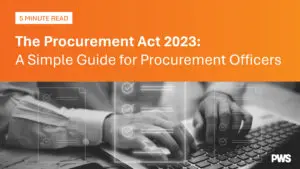The Procurement Act 2023: A Guide for Procurement Officers
The Procurement Act 2023 introduces significant changes to the way the UK government manages its purchasing process. These changes aim to simplify procedures, enhance transparency, and provide more flexibility, especially in light of the UK’s exit from the EU. For procurement officers, particularly those involved in sourcing PPE and workwear, it is important to understand these changes and how they will affect their roles.
Simpler Procurement Processes
One of the biggest changes introduced by the Act is the simplification of procurement procedures. The number of procedures is reduced from seven to just three, making it easier for procurement officers to navigate the process:
- Open Procedure: Used for straightforward purchases where suppliers meet the required criteria.
- Competitive Flexible Procedure: A new, adaptable approach that replaces most previous procedures.
- Limited Tendering Procedure: For specific cases where contracts can be awarded directly without competition.
These changes are designed to save time and reduce the amount of paperwork, enabling procurement officers to make quicker and more efficient decisions.
A Shift to Digital
The Procurement Act also brings in digital changes to streamline the procurement process:
- A centralised digital platform (the existing ‘Find a Tender‘ service) will be used for all public procurement activities, providing a single, online location for managing contracts.
- Mandatory electronic publication of procurement pipelines for contracts over £100 million and notices at every stage of the procurement lifecycle will ensure greater transparency.
- New transparency notices will be required for direct awards, so that all decisions are clearly documented and accessible.
Procurement officers will need to familiarise themselves with the digital platform and ensure compliance with these publication and transparency requirements.
Changes to Frameworks and Supplier Engagement
The Act introduces key changes to framework agreements, which allow suppliers to be pre-approved to provide goods or services over a set period:
- Standard frameworks will now be limited to 4 years (with the exception of utilities, which will last 8 years).
- The introduction of open frameworks will allow new suppliers to join throughout the agreement period.
- Mandatory competition for call-offs (the process of placing orders with a supplier) will ensure that procurement officers always choose the best supplier for each specific need.
These changes make it easier to engage with a wider range of suppliers, including smaller businesses, and ensure that procurement remains competitive.
Increased Transparency and Ethical Standards
The Act introduces stricter rules around transparency and ethical standards in procurement:
- There will be greater publication of key procurement information at each stage of the process, making it easier for suppliers to understand how decisions are made.
- The Act includes a centralised debarment list for suppliers who fail to meet the necessary ethical standards, ensuring that only reliable suppliers are chosen.
- Procurement officers will need to ensure that suppliers comply with these ethical standards, particularly around responsible sourcing and fair labour practices.
Performance Monitoring and Contract Management
The Procurement Act places a stronger focus on performance monitoring and contract management. Key changes include:
- Procurement officers must set key performance indicators (KPIs) to measure supplier performance on important factors like quality, timeliness, and compliance with the contract terms.
- For contracts exceeding £5 million, at least three KPIs must be established to ensure that the performance of suppliers is regularly monitored.
- New rules also require contract change notices and reporting on contract performance to ensure that any changes or issues are documented and addressed.
These measures help ensure that contracts deliver the expected outcomes and suppliers are held accountable for their performance.
What the Changes Mean for Procurement Officers
The key benefits of these changes for procurement officers include:
- Faster Decision-Making: The simplified procedures and digital processes will streamline procurement, allowing for quicker decisions.
- More Supplier Options: The ability to engage with a broader range of suppliers, including SMEs, will increase competition and ensure a wider selection of innovative solutions.
- Greater Transparency: Enhanced transparency requirements will make it easier to justify procurement decisions and provide clearer communication with suppliers.
- Improved Supplier Performance: The focus on performance monitoring through KPIs ensures that suppliers meet high standards and deliver quality results.
Preparing for the Changes
The Procurement Act 2023 will come into full effect on 24th February 2025, giving procurement officers time to prepare for the changes. To get ready, procurement teams should:
- Understand the new regulations: Familiarise themselves with the new procedures and how they will impact the procurement process.
- Get ready for the digital platform: Learn how to use the centralised digital system and ensure that staff are trained to use it effectively.
- Review contracts and frameworks: Ensure that any existing contracts and frameworks are aligned with the new rules and make plans to refresh supplier engagements.
- Train staff: Ensure that all team members understand the new processes and the changes that will affect their daily work.
Conclusion
The Procurement Act 2023 represents a major shift in how the UK government conducts its procurement activities, offering procurement officers a more efficient, transparent, and flexible system. The simplification of procedures, the introduction of digital tools, and the focus on performance and ethical standards all aim to make the procurement process smoother and more effective.
For further guidance, procurement officers can refer to the official resources provided by the UK Government and relevant training materials to stay up to date.
The UK Government’s official guide to the Procurement Act 2023 for suppliers: https://www.gov.uk/government/publications/procurement-act-2023-short-guides/the-procurement-act-2023-a-short-guide-for-suppliers-html
Published February 2025
